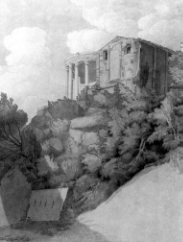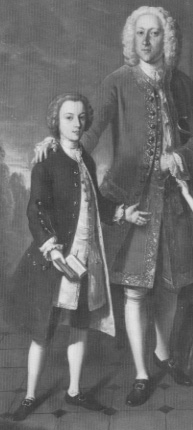Growing up, George Moneybanks was fortunate enough to always have the
newest toys to play with. He could always be found playing with
marbles, soldiers, guns, or tops.
He was the envy of all of his playmates,
especially when his father brought home a brand new rocking
horse from France! While he is away at Eaton, George's time is more
structured, and he
must engage in organized recreational activities. He and his school
friends
enjoy athletics, particularly cricket. His father expects him to be
the best player on the team.
As soon as George finishes his studies, he will have the privilege to
travel throughout Europe on The
Grand Tour. It is a very expensive trip, but George will be able to
see many countries, including France, Italy, and Greece.
George will able be able to develop his social skills, as he transforms into
a young gentleman.
During the Eighteenth Century, more money started pouring into children's
leaisure activities. Toys started being mass-produced, which allowed a
large assortment and quantity to be available.
Some parents, like George's were wealthy enough to purchase all of the
newest products for their children. Tin soldiers became a popular toy, and
some more expensive soldiers started being made out paper. Young boys
also enjoyed playing with yo-yo's, rollarskates, and music boxes.
A very popular toy in the Eighteenth Century was the rocking horse. They
were originally from France, and were quite expensive. In contrast to
today's rocking horses, the eighteenth century original ones only had a
head and a body that
was fixed on to a rocker.
While young boys were away at school, there was plenty of time for fun and
recreation. Games like cricket and hockey were played at school,
particularly at Eaton. Parents would become competitive on how well their
son was playing. Many games were also invented by children
during the Eighteenth Century, such as bally cally, hoops, and pig in the
ring.
Also while away at school, boys often took on the practice of letter
writing. Letter writing was a convenient way to keep in contact with
families back at home, and was also viewed as a high-quality activity.
Children's letters were "stiff and formal, to our way of thinking, they
yet breathe out the spirit of the age, and are often of a great simplicity
and pathos."
11
"Eaton, Septembr. ye 29th.
The Rocking Horse, By James Ward.
This is a letter from a boy to his family.
Honed. Sir,
I write this to pay my duty to you, and to lett you know that I am well. I
hope you and my mama have found great benefit from the Bath, and it would
be a very great satisfaction to me to hear how you do ; I was in hopes of
an answer to my last letter, to have heard how you both did, and how I
should direct my letters to you, for not knowing how to direct my letters
has hindered me writing to you, my time has been pretty much taken up for
these three weaks in my trying for to gett into the fiveth form, and I am
now removed into it ; pray my duty to mama and service to my uncle and
aunt Stuart if no att the Bath. I am, with great respect.
Honed. Sir.
Your most dutiful son
WILLIAM PITT."
12
Click on George's picture to return to his bio. Click on
the kiddies to return to the main page. Once boys completed the school work, the some of the wealthier ones had
the opportunity to travel on The
Grand Tour. This trip had young men sailing from England and on to
different countries in Europe. This picture is from Tivoli, one of the
many stops on the tour, along with Prague, Vienna, Venice, Paris, and many
more. These boys would be accompanied by a professional 'Governor', and
would be tested on their endurance with the "dangers from bandits, the
grasping stage-coach drivers, cheating innkeepers and hazards of passing
over the Alps." 158
Once boys completed the school work, the some of the wealthier ones had
the opportunity to travel on The
Grand Tour. This trip had young men sailing from England and on to
different countries in Europe. This picture is from Tivoli, one of the
many stops on the tour, along with Prague, Vienna, Venice, Paris, and many
more. These boys would be accompanied by a professional 'Governor', and
would be tested on their endurance with the "dangers from bandits, the
grasping stage-coach drivers, cheating innkeepers and hazards of passing
over the Alps." 158

